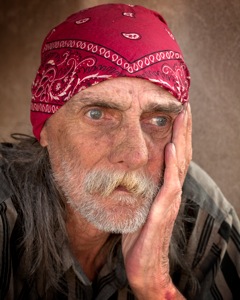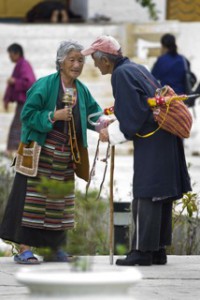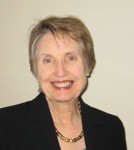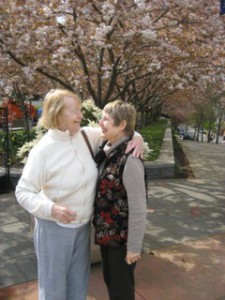Monday
Community ArticlesReceiving the Goodness of our Elders
 COLUMN: Aging in Enlightened Society
COLUMN: Aging in Enlightened Society
View Versus Agenda
by Ann Cason
“Kindness cuts through isolation, fear, and aggression. All of us can remember moments of kindness that changed our day, at least – and maybe our lives. When we relegate kindness to mere social courtesy, we are handicapping our access to the ambassador of love and compassion – deeply held powers of the human heart. If we want to continue to evolve, we should cultivate ordinary kindness. With kindness, we will shift our future.”
~ Sakyong Mipham in The Shambhala Principle
In his new book, The Shambhala Principle, Sakyong Mipham presents a view that we as human beings are basically good. By that, he means that we are whole, complete, and worthy. Kindness and compassion are at the core of our human nature.
In my field of gerontology, the world is gearing up to care for the baby boomers, who because of their vast numbers, are predicted to become a burden upon our declining society instead of a blessing. But older people are the holders of the cultural transmission of basic goodness. All human beings are holders of basic goodness, but it is more accessible in older people, even though often missed.
 As older people begin to have diminished life force and dimming senses, space needs to be provided so that this transmission will not be lost. Then caregivers can receive it and nourish it and share it from where they find it: by slowing down, listening, practicing kindness and feeling the heart.
As older people begin to have diminished life force and dimming senses, space needs to be provided so that this transmission will not be lost. Then caregivers can receive it and nourish it and share it from where they find it: by slowing down, listening, practicing kindness and feeling the heart.
Many old people plod along trying to make it through the day. Many caregivers think that their task is to make sure that they won’t run away, that they will stop driving, that their dementia will not drive us crazy. Or at the very least, that they will have a healthy aging with proper food and medicine and relationships. Protection is good, but only the start.
Although aging is a time of life that brings possibilities, the tendency is to regret the way life turned out. Many elders collapse under the weight of unhappiness. They don’t have the energy to engage. So often both family and professionals approach older adults with an agenda to fix or console. But there is a danger of the mind getting stuck on pity or sadness, rather than expanding into the enriched heart and mind.
After reading The Shambhala Principle, I feel more than ever that the work to be done with our elders is to connect with and receive basic goodness. We could create a culture of kindness for older people and in so doing, we would create it for ourselves. Or it could be the other way around. We could create the culture of kindness and ask the older ones in. Walk right in says the spider to the fly. And the good thing is that we don’t have to tear down or dismantle or just not participate in the world that is right under our nose. What is it that takes us farther than we thought we could go? What is it that makes the heart take wing so that you suddenly know and feel brave? Feeling basic goodness leads to curiosity and care.The following is a story of a family caregiver who, at the end of his rope, got really brave and stepped beyond his agenda of what he thought a good husband should be.
I met Dan at a family support group. He had cared for his wife, who suffered from Parkinson’s for many years. Overwhelmed by her illness, she would not let anyone except her husband care for her.
Dan heard about a camp that was designed for caregivers and their loved ones who needed care. One day he got her into the car to take her for a drive. Without speaking, he drove her straight to the camp, got there in time for dinner where they sat with other couples and had a nice time. She agreed to spend the night and went off with a caregiver, while her husband went to a dorm to spend the night with other husbands.
In the middle of the night, he awoke to the sound of a man calling out, “Wake up, wake up, come outside.” Fearful that it might be a fire or other disaster, he ran out. Then he stopped and looked up. A full moon shone down flooding the flat ground with moon light. The men from the dorm stood together basking in the magic. “That is the first time I have seen the moon in many years,” he told his wife as they drove home the next day. And she agreed to come back to the camp again.
To read more articles in this Column, please click here.
~~
 Ann Cason is a pioneer in bringing the principles of mindfulness, compassion, and respect into the care of elderly people. Her book, Circles of Care (Shambhala Publications) is an innovative exploration of the issues involved in working with old age. Her insights come from many years of professional and personal experience. She is a geriatric care manager based in Portland, Oregon and is a member of the Shambhala Working Group on Aging.
Ann Cason is a pioneer in bringing the principles of mindfulness, compassion, and respect into the care of elderly people. Her book, Circles of Care (Shambhala Publications) is an innovative exploration of the issues involved in working with old age. Her insights come from many years of professional and personal experience. She is a geriatric care manager based in Portland, Oregon and is a member of the Shambhala Working Group on Aging.






Oct 2, 2013
Reply
I like this story very much. Here in Portland, Oregon we just had the first meeting of what we want to call the Portland Aging Mandala. I read your story to the group, and it was very well received. I am going to post it on my blog.
Sep 18, 2013
Reply
Thank you, Phyllis. I agree. Some practical actions rather than just philosophy would be helpful. I haven’t even found so much as a discussion group on ageing in my area. There was a brief video presentation once, but the cost was prohibitive for me and some others. The cost of Shambhala programming is prohibitive for many older people who would like very much to practice and participate. Older people have a lot to share, but there is little room for that sharing to take place. As we age and die, we are forced to rely on inadequate support from outside the Shambhala community. If people have ideas about how to make meaningful changes, I would so like to hear them.
Aug 27, 2013
Reply
No one, so far, has really addressed this within the sangha though there has been a ‘working group’ given to the topic. There are no talks about collective living, or building a retirement community that is affordable. Most do have some form of social security benefits. Nor is there any talk of “moving” the dharma elders closer to the opening in the tent, the position of esteem in some cultures. We can speak of this topic in a broad sense but it might be time to deal with it in a more specific, pragmatic and closer to home sense. I have said similar things before but I have had no sign that anyone is listening or ready for action. Instead, I, and others, have noticed a general trend toward moving the elders out of useful positions. Since our Shambhala society seems to be an hierarchical one, I might have said higher positions, directorships and so on. I personally regret the sideways hierarchical progression but, and here’s the topper, the elders don’t have any voice. You can site the basic goodness theme ad infinitum but this important aspect of this society as a whole entity is missing the elder piece. It seems there are enough people on the roll call to have some foresight rather than leave caretaking to close relative, friends, social services, or senior centers. A Shambhala approach to this ‘gearing up’ would be welcome. Anyone??
Aug 26, 2013
Reply
Our Elders as teachers:
I remember very vividly one of the greatest transmissions my grandmother gave to me. She was hospitalized and in the process of dying. We were alone in her hospital room, her in bed and me sitting bed-side. The conversation turned to the future, and it hit home that she would not be around much longer – that my future would not have a Grandma Trudy in it in her present form. I choked up and started to stumble through some kind of goodbye, and she turned to me and said quite simply: “Oh, this is your first big goodbye. I will try to show you a good death.” And she held true to her word – approaching her own passing with honesty and humor – allowing herself to feel and struggle and let go in such a dignified and selfless way. Her teaching still touches my heart.
When we divorce ourselves from our elders, we miss these great teachings. It is my secret hope that with the baby boomers aging, and the lack of social resources, we may find solution in reintegrating our elders into our homes and daily lives and reconnect to our personal lineages.
Aug 20, 2013
Reply
One of my Tibetan friends who has lived in to Tibet, China, India, and Nepal said that when she first came to the US the first thing she noticed was the “lack of old people everywhere”. All she could think was, “what have they done with them?” She said it was so startling compared to any other country she had visited that she was sure we were hiding them somewhere. Where she was from there were always very active elders walking around outside.
I think with the baby boomers we could start to really see the first generation of Americans retiring outside the US with their Social Security money. For instance, migrating to Asia to be able to afford the cost-of-living and have a good quality of life including more affordable (and elder respectful) medical care.
Aug 20, 2013
Reply
We all would like to age gracefully with dignity and have the financial means to have a comfortable life until our passing. This will happen to some; however, there are many within the baby boomer generation that are in financial crisis and see a dim future for late old age and being taken care of with dignity. The numbers are actually huge and many of that generation are opting for suicide, if you look at the numbers. Somehow this needs to be addressed or very simply many will suffer in a way that seems terrible for the richest country in the world. This is not only an economic problem but also a spiritual one.